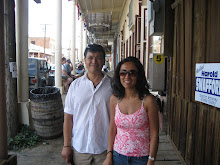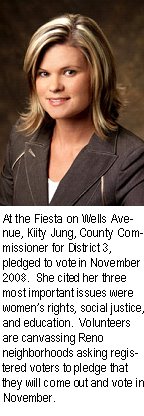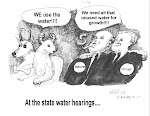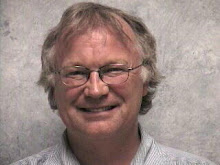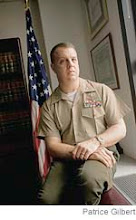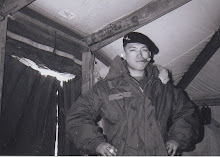 "At 19, I carried a steel helmet and a Kevlar flak jacket, an M-16 with six extra magazines of 5.56 ammo (180 rounds), extra belts of 7.62 ammo (200 rounds) for the M-60 Machine Gun, an extra barrel, two Light Anti Tank Weapons, two Claymore Anti Personnel mines, four fragmentation grenades, 1 white phosphorous grenade, a bayonet, and a K-Bar Combat Knife. There were also signal flares, and smoke grenades for signaling and marking targets. They are things in the most physical and concrete sense― a magnetic compass, maps, mosquito repellent and compresses and bandages, pocket knives, P-38s, dog-eared photos, and chewing gum, and the the figurative weight of memory and the literal weight of those who depended on me, like Pfc. Rother. To quote Tim O'Brien, those were the things I carried. Additionally, as a senior Marine in the squad and a Lance Corporal, using the Prick-77 Field Radio, I could call in artillery and mortar fire, Specter and Helicopter Gunships, napalm strikes and naval gunfire. I snaked through the rubble of this world, me and my grim friends like death's pale shadow. However, the most destructive weapon I had in my arsenal was my anger, and I wielded it with great impunity. When cautious parents tell stories of the evil that awaits misbehavior, it is I that they conjure." Email sent to Dr. Carina Black, PhD by Joaquin Rafael Roces, 6 May 2008
"At 19, I carried a steel helmet and a Kevlar flak jacket, an M-16 with six extra magazines of 5.56 ammo (180 rounds), extra belts of 7.62 ammo (200 rounds) for the M-60 Machine Gun, an extra barrel, two Light Anti Tank Weapons, two Claymore Anti Personnel mines, four fragmentation grenades, 1 white phosphorous grenade, a bayonet, and a K-Bar Combat Knife. There were also signal flares, and smoke grenades for signaling and marking targets. They are things in the most physical and concrete sense― a magnetic compass, maps, mosquito repellent and compresses and bandages, pocket knives, P-38s, dog-eared photos, and chewing gum, and the the figurative weight of memory and the literal weight of those who depended on me, like Pfc. Rother. To quote Tim O'Brien, those were the things I carried. Additionally, as a senior Marine in the squad and a Lance Corporal, using the Prick-77 Field Radio, I could call in artillery and mortar fire, Specter and Helicopter Gunships, napalm strikes and naval gunfire. I snaked through the rubble of this world, me and my grim friends like death's pale shadow. However, the most destructive weapon I had in my arsenal was my anger, and I wielded it with great impunity. When cautious parents tell stories of the evil that awaits misbehavior, it is I that they conjure." Email sent to Dr. Carina Black, PhD by Joaquin Rafael Roces, 6 May 2008Last Wednesday, on the 14th of May 2008, prior to the 2008 Spring Commencement ceremonies, Joaquin Rafael Roces was awarded the Thornton Peace Prize for the Class of 2008 at the Joe Crowley Student Union. It was presented to him by University President Milton Glick. He was nominated by a friend and classmate of his, J
 ulie Balderson, who selflessly thought he, of all people, deserved the award. The Thornton Peace Prize was established at the University of Nevada Reno in 1970 by William and Barbara Thornton , both of whom were graduates of the university. It is presented to a person or group who exemplifies the premise that the use of force is not an acceptable means of settling disputes. Some other noted recipients are Fungisia Nota who served as a volunteer for an AIDS Care Group during the summer of 2005 and UNR Professor, Dr. Leonard Weinberg, for his work in promoting Christian-Jewish reconciliation in 1999. Joaquin was nominated for his decade-long work with victims of child abuse and domestic violence on Indian Reservations in Northern Nevada, and for his work in public diplomacy at the Northern Nevada International Center by building bridges between Americans and Nevadans and visiting foreign officials and delegates. Joaquin's work at the International Center advances the concept of Citizen Diplomacy, that an individual has the right, even the responsibility, to help shape US foreign relations "one handshake at a time."
ulie Balderson, who selflessly thought he, of all people, deserved the award. The Thornton Peace Prize was established at the University of Nevada Reno in 1970 by William and Barbara Thornton , both of whom were graduates of the university. It is presented to a person or group who exemplifies the premise that the use of force is not an acceptable means of settling disputes. Some other noted recipients are Fungisia Nota who served as a volunteer for an AIDS Care Group during the summer of 2005 and UNR Professor, Dr. Leonard Weinberg, for his work in promoting Christian-Jewish reconciliation in 1999. Joaquin was nominated for his decade-long work with victims of child abuse and domestic violence on Indian Reservations in Northern Nevada, and for his work in public diplomacy at the Northern Nevada International Center by building bridges between Americans and Nevadans and visiting foreign officials and delegates. Joaquin's work at the International Center advances the concept of Citizen Diplomacy, that an individual has the right, even the responsibility, to help shape US foreign relations "one handshake at a time." Nevada's First Lady, Mrs. Dawn Gibbons poses with judges from Kazakhstan and
Nevada's First Lady, Mrs. Dawn Gibbons poses with judges from Kazakhstan andthe Nevada Supreme Court. Joaquin developed and coordinated the Open World
Program that brought four judges from Kazakhstan to Reno, NV. Since 2005,
Joaquin has coordinated 36 programs involving over 100 international
visitors from 25 countries.
As a criminal prosecutor in tribal court, he was one of the first to adopt a "no drop policy" in prosecuting domestic and spousal batterers in Nevada's Indian Country, and in 2000 worked with TMCC and the Northern Nevada Law Enforcement Academy to host the Walker River Domestic Violence Training Conference. Then Assemblywoman Dawn Gibbons was the keynote speaker. He represented tribal interests on the Washoe County Domestic Violence Task Force and the Fatality Review Team under Judge Janet Berry. He also participated in Attorney General Frankie Sue Del Papa's Full Faith and Credit Taskforce. He was a presenter and facilitator for US Attorney Dan Ogden's Native American Conference speaking on the techniques of prosecuting domestic violence cases as "victimless crimes," much like a homicide, prosecutors and law enforcement build their cases on forensics and evidence, instead of relying solely on a battered and frightened witness. He served under Governor Kenny Guinn as a Commissioner on the Nevada Indian Commission from 2000-2005. Kathy Bryan of the Pyramid Lake Paiute Tribe remembers Joaquin from his time at Pyramid Lake as a Criminal Prosecutor, said this of Joaquin when she heard of his award, "Besha oosu, Joaquin. Besha nana." In her native Paiute language, an elder and social worker for the tribe, Kathy said "You are good, Joaquin. A good man."
 At the Northern Nevada International Center and Nevada Committee on Foreign Relations, Joaquin worked to develop and implement educational and cultural exchange programs between foreign officials and dignitaries and their American counterparts in Nevada. Some noted alumni from these exchange programs are: Hamid Karzai, Tony Blair, Margaret Thatcher, Anwar Sadat, F.W. deKlerk and Indira Gandhi all visited the United States on International Visitor programs. President Nicolas Sarkozy and the new British Prime Minister Gordon Brown are also alumni. In January of this year, Joaquin wrote "We do not need more US Soldiers in Iraq or the Middle East, we need another Anwar Sadat...This is what these programs produce: an Indira Ghandi, India's first and to date only female prime minister, or a DeKlerk who engineered the end of apartheid, and shared the Nobel Peace Prize with Nelson Mandela in 1993 for his role in the deconstruction of apartheid." Joaquin recalls Anwar Sadat's own visit to America long before he became president of Egypt. Prior to his participation in the exchange program, Mr. Sadat, was not a fan of the U.S. or of the American people and held a negative view of our people and our society; yet at the end of the program he admitted to a program official that his view of America and its people had changed for the positive. Mr. Sadat created a citizen exchange program with Israel based on his experience in America. President Anwar Sadat, frustrated with the Geneva track peace process, pursued preparatory meetings between Egyptian and Israeli officials, unknown even to the Americans. In November 1977, Anwar Al Sadat became the first Arab leader to visit Israel, thereby implicitly recognizing Israel. In Sadat's Knesset speech he talked about his views on peace, the status of Israel's occupied territories, and the Palestinian refugee problem. This tactic went against the intentions of both the United States and the Soviet Union, but breathed new life to the stalled Geneva Conference. On September 17, 1978, The Camp David Accords were signed by Egyptian President Anwar Sadat and Israeli Prime Minister Menachem Begin following twelve days of secret negotiations at Camp David. The two agreements were signed at the White House, and were witnessed by United States President Jimmy Carter. The Accords led directly to the 1979 Israel-Egypt Peace Treaty.
At the Northern Nevada International Center and Nevada Committee on Foreign Relations, Joaquin worked to develop and implement educational and cultural exchange programs between foreign officials and dignitaries and their American counterparts in Nevada. Some noted alumni from these exchange programs are: Hamid Karzai, Tony Blair, Margaret Thatcher, Anwar Sadat, F.W. deKlerk and Indira Gandhi all visited the United States on International Visitor programs. President Nicolas Sarkozy and the new British Prime Minister Gordon Brown are also alumni. In January of this year, Joaquin wrote "We do not need more US Soldiers in Iraq or the Middle East, we need another Anwar Sadat...This is what these programs produce: an Indira Ghandi, India's first and to date only female prime minister, or a DeKlerk who engineered the end of apartheid, and shared the Nobel Peace Prize with Nelson Mandela in 1993 for his role in the deconstruction of apartheid." Joaquin recalls Anwar Sadat's own visit to America long before he became president of Egypt. Prior to his participation in the exchange program, Mr. Sadat, was not a fan of the U.S. or of the American people and held a negative view of our people and our society; yet at the end of the program he admitted to a program official that his view of America and its people had changed for the positive. Mr. Sadat created a citizen exchange program with Israel based on his experience in America. President Anwar Sadat, frustrated with the Geneva track peace process, pursued preparatory meetings between Egyptian and Israeli officials, unknown even to the Americans. In November 1977, Anwar Al Sadat became the first Arab leader to visit Israel, thereby implicitly recognizing Israel. In Sadat's Knesset speech he talked about his views on peace, the status of Israel's occupied territories, and the Palestinian refugee problem. This tactic went against the intentions of both the United States and the Soviet Union, but breathed new life to the stalled Geneva Conference. On September 17, 1978, The Camp David Accords were signed by Egyptian President Anwar Sadat and Israeli Prime Minister Menachem Begin following twelve days of secret negotiations at Camp David. The two agreements were signed at the White House, and were witnessed by United States President Jimmy Carter. The Accords led directly to the 1979 Israel-Egypt Peace Treaty.In his two and half years at the International Center, Joaquin has developed and implemented 36 programs, hosting over a hundred international visitors. Joaquin adds, "The solution is right before our eyes. We do not need to reinvent the wheel. Sadat and Begin made it work, though Sadat was assassinated, his peace treaty still holds to this day. These programs are the key to preventing another 9/11 and what keeps US Soldiers, our fathers and brothers, sisters and sons, out of harm's way."

One of his favorite quotes is one by Leo Tolstoy, "everyone thinks of changing the world, but no one thinks of changing themselves." Joaquin recalls his youth as a Marine Rifleman, a three time rifle expert. The highest award given to a marksman, it embodies the Marine Corps philosophy of "one shot; one kill." Now a father of three sons, James, Michael and Sean, Joaquin reflects on his new prize and award, and the long broken road that led him to this point: an alcoholic and abusive step-father, a troubled childhood and brushes with the law. Now a published poet and aspiring writer, Joaquin loves to quote writers, and as he reflects upon the Thornton Peace Prize, Joaquin credits his change to friends, like Sarah Class (Joaquin's close friend and Buddhist mentor), Father Bob at Our Lady of Snows, and of course his classmate, Julie Balderson. "I was fortunate to be surrounded with the friends and family that I had. They have made a difference in my life." He has been a Sunday School teacher since 1999, and taught at Our Lady of the Oasis at the Fallon Naval Airbase and at Our Lady of Snows in Reno. He is a Eucharistic Minister for his local Parish. With Progressive Leadership Alliance of Nevada's Civic Engagement Initiative, Joaquin worked with high school kids to improve voter participation in our area; and twice in the past week, he has volunteered his time a
 t Pine and Mamie Towles Middle Schools to read stories to children. Joaquin says with this honor, he remains bittersweet. He is divorced and has a fractured relationship with his teen-aged sons, and at times still struggles with his past. None of his sons attended his award ceremony or his commencement. A poet and former rodeo bull-rider, Joaquin once wrote in a poem that raising sons was like an 8-second bull ride. At the moment it seems like it stretches for an eternity, but in reflection it all passes so quickly. He remains resolute in finding peace in his life and is solid in the thought that his relationship with his sons will heal in time, "the boys know that I always love them, even though right now we do not see eye to eye." As Joaquin looks down at his framed certificate, he quietly says "this is for my friend, Will Taylor." Will was a very close friend who died in 2006 of an overdose, "...he (Will) spent many afternoons coaching my sons in football and bailed me out of some rough times as well. He would help any man up and saw no difference in people, he just saw people, not rich nor poor, black nor white, just people who needed help, and he was always there to help. He was a very good friend. He reminds me that though we are not the absolute angels we wish we were, we are neither the demons we see ourselves to be." Additionally, he mentions his friend, Buddhist teacher and mentor, Sarah Class, who in Joaquin's eyes has been a great instrument of peace and healing in his life. Sarah attended Joaquin's Award Ceremony on May 14th. In closing, Joaquin recalls another favorite writer, William Butler Yeats, "Think where man's glory most begins and ends, and say my glory was I had such friends."
t Pine and Mamie Towles Middle Schools to read stories to children. Joaquin says with this honor, he remains bittersweet. He is divorced and has a fractured relationship with his teen-aged sons, and at times still struggles with his past. None of his sons attended his award ceremony or his commencement. A poet and former rodeo bull-rider, Joaquin once wrote in a poem that raising sons was like an 8-second bull ride. At the moment it seems like it stretches for an eternity, but in reflection it all passes so quickly. He remains resolute in finding peace in his life and is solid in the thought that his relationship with his sons will heal in time, "the boys know that I always love them, even though right now we do not see eye to eye." As Joaquin looks down at his framed certificate, he quietly says "this is for my friend, Will Taylor." Will was a very close friend who died in 2006 of an overdose, "...he (Will) spent many afternoons coaching my sons in football and bailed me out of some rough times as well. He would help any man up and saw no difference in people, he just saw people, not rich nor poor, black nor white, just people who needed help, and he was always there to help. He was a very good friend. He reminds me that though we are not the absolute angels we wish we were, we are neither the demons we see ourselves to be." Additionally, he mentions his friend, Buddhist teacher and mentor, Sarah Class, who in Joaquin's eyes has been a great instrument of peace and healing in his life. Sarah attended Joaquin's Award Ceremony on May 14th. In closing, Joaquin recalls another favorite writer, William Butler Yeats, "Think where man's glory most begins and ends, and say my glory was I had such friends."This article was written in collaboration with Jenny A. Herron, a graduate of the University of Nevada Reno, who currently lives in Beijing, China.




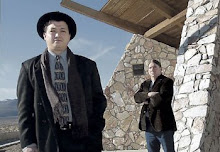



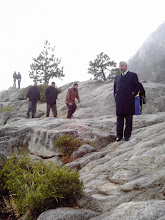+of+2-27-2007-040.jpg)


